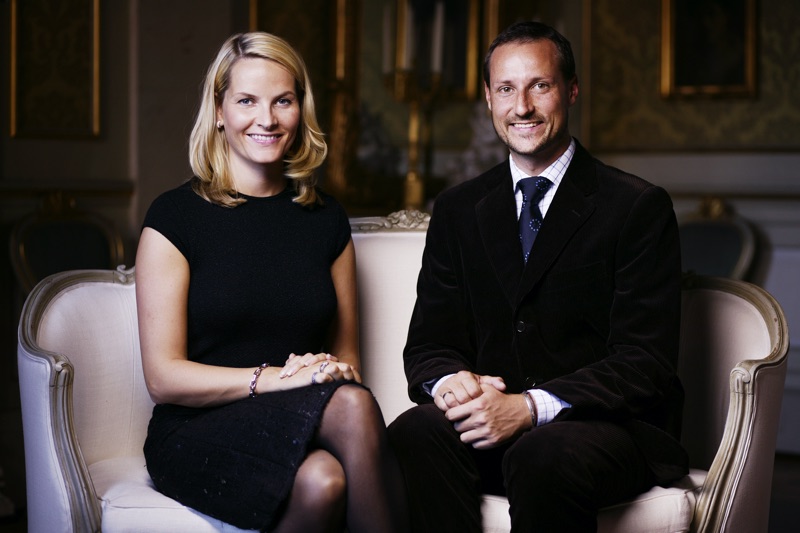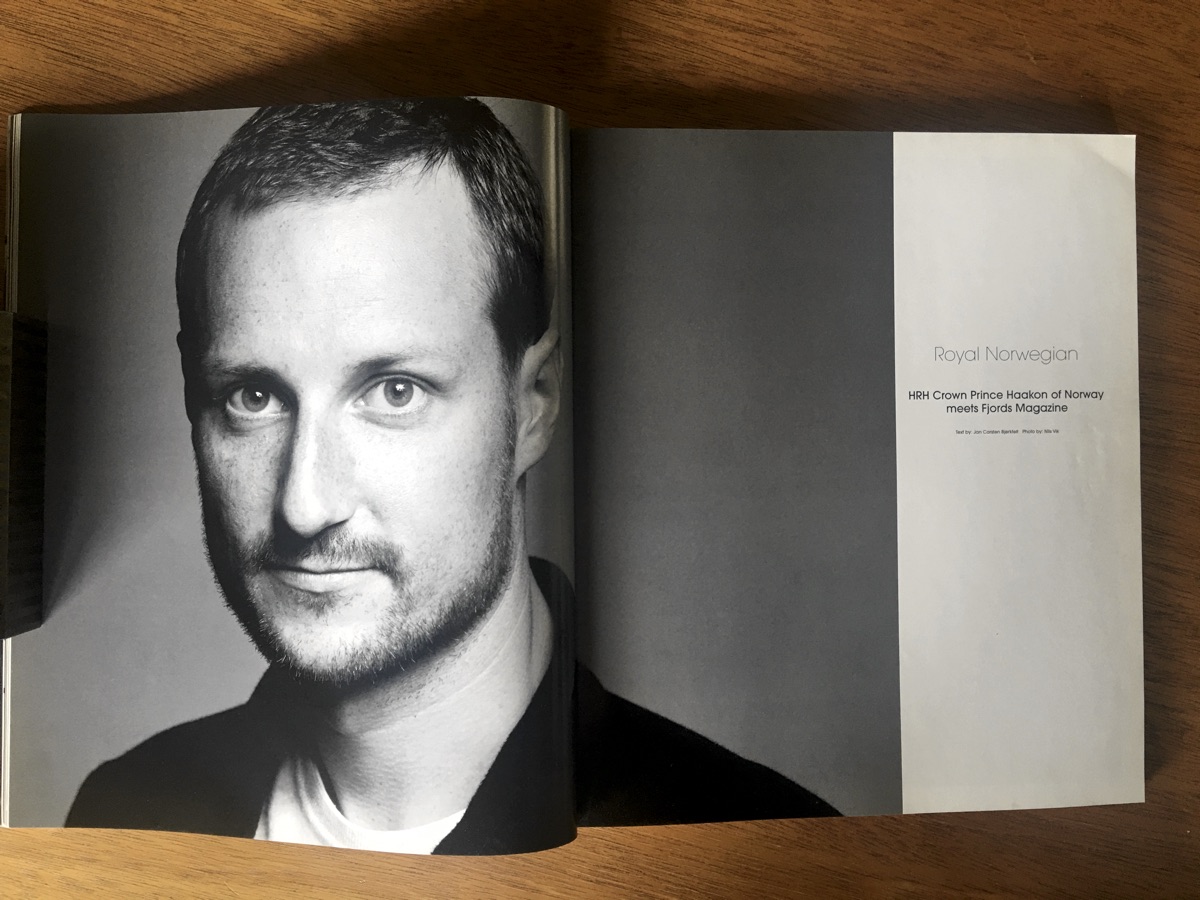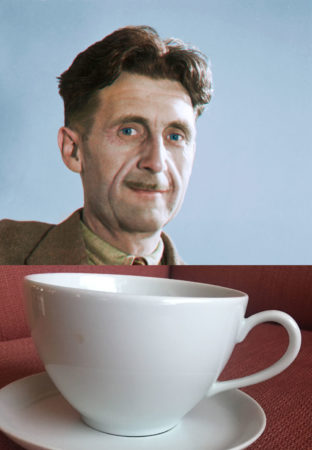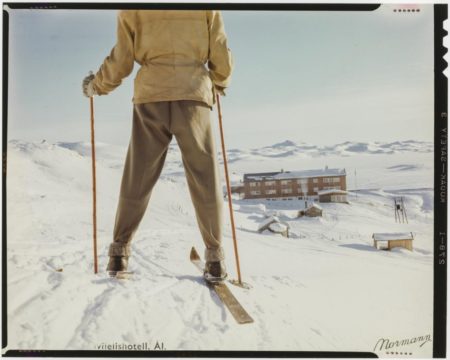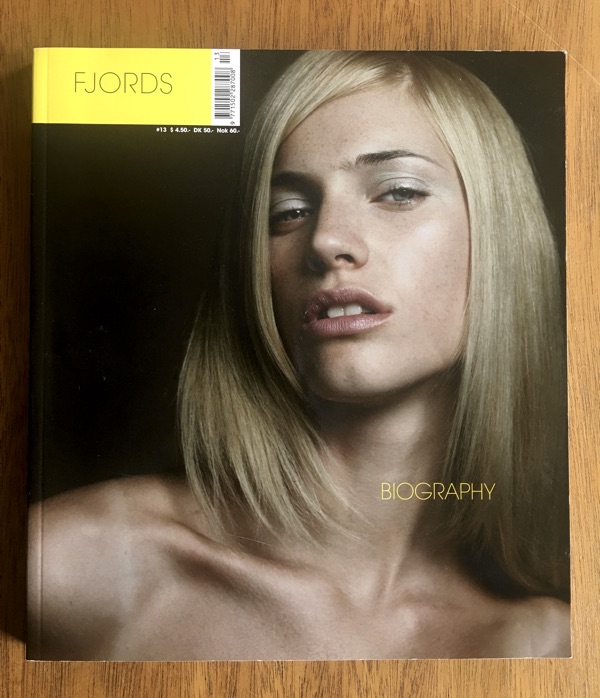
Vi har kikket i arkivet.
Dette intervjuet med Kronprins Haakon fra Asker ble publisert i Fjords Magazine i oktober 2004. Fotograf var Nils Vik, og undertegnede, nå redaktør i SummaB, var utsendt «hoffreporter».
***
Royal Norwegian
HRH Crown Prince Haakon of Norway
meets Fjords Magazine
This interview has previously been published in Fjords Magazine, October 2004
Text by Jan Carsten Bjerkfelt
Photo by Nils Vik
***
Walking through the park up to Oslo’s Royal Palace is something I have done many, many times. But this time it’s something special. Today I’m actually going into the castle.
After we have been received and checked in the reception, the photographer and I are led through many rooms and corridors in the Palace and finally come into the big ballroom on the first floor. Here the photo equipment has already been rigged. The stylist and the make-up artist are ready to help the photographer capture the Crown Prince.
Then we are introduced to the Royal Palace’s Chief of Staff and the Crown Prince’s Aide. Shortly after we are met by the Crown Prince’s advisor and led to the waiting room just outside the office of the Crown Prince, which, by the way, is known as one of the most elegant rooms in the entire palace.
I check the knot in my tie one last time. Then the advisor knocks firmly on the tall door of the office of the Crown Prince.
Inside Crown Prince Haakon is standing. He proceeds towards us and greets us in a polite, correct, but warm way.
«Good morning», he says.
***
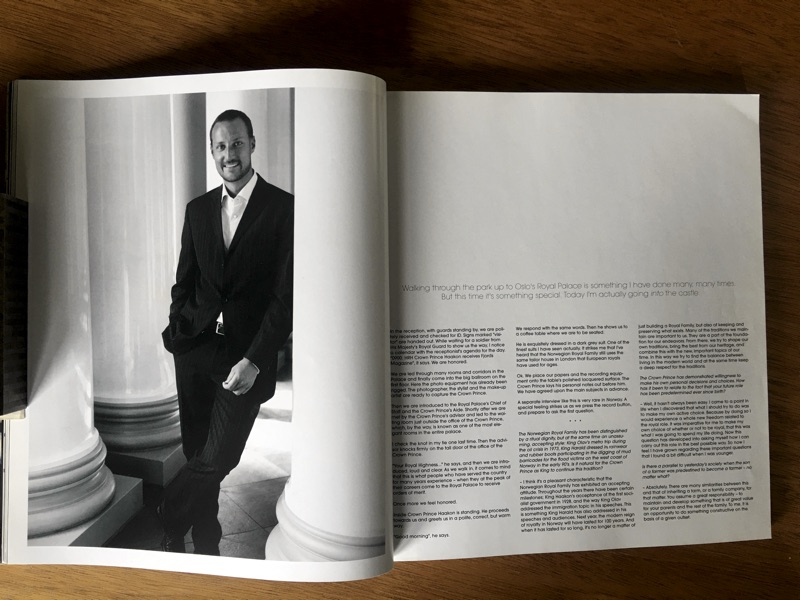
The Norwegian Royal Family has been distinguished by a ritual dignity, but at the same time an unassuming, accepting style: King Olav’s metro trip during the oil crisis in 1973, King Harald dressed in rainwear and rubber boots participating in the digging of mud barricades for the flood victims on the west coast of Norway in the early 90’s. Is it natural for the Crown Prince as King to continue this tradition?
– I think it’s a pleasant characteristic that the Norwegian Royal Family has exhibited an accepting attitude. Throughout the years there have been certain milestones; King Haakon’s acceptance of the first socialist government in 1928, and the way King Olav addressed the immigration topic in his speeches. This is something King Harald has also addressed in his speeches and audiences. Next year, the modern reign of royalty in Norway will have lasted for 100 years. And when it has lasted for so long, it’s no longer a matter of just building a Royal Family, but also of keeping and preserving what exists. Many of the traditions we maintain are important to us. They are a part of the foundation for our endeavors. From there, we try to shape our own traditions, bring the best from our heritage, and combine this with the new, important topics of our time. In this way we try to find the balance between living in the modern world and at the same time keep a deep respect for the traditions.
– I came to a point in life when I discovered that what I should try to do was to make my own active choices.
The Crown Prince has demonstrated willingness to make his own personal decisions and choices. How has it been to relate to the fact that your future role has been predetermined ever since birth?
– Well, it hasn’t always been easy. I came to a point in life when I discovered that what I should try to do was to make my own active choices. Because by doing so I would experience a whole new freedom related to the royal role. It was imperative for me to make my own choice of whether or not to be royal, that this was what I was going to spend my life doing. Now this question has developed into asking myself how I can carry out this role in the best possible way. Today I feel I have grown regarding these important questions that I found a bit difficult when I was younger.
– You assume a great responsibility – to maintain and develop something that is of great value for your parents and the rest of the family.
Is there a parallel to yesterday’s society when the son of a farmer was predestined to become a farmer – no matter what?
– Absolutely. There are many similarities between this and that of inheriting a farm, or a family company, for that matter. You assume a great responsibility – to maintain and develop something that is of great value for your parents and the rest of the family. To me, it is an opportunity to do something constructive on the basis of a given outset.
The most important thing is that one has made a personal choice, that “this is what I want to do”, and from there one can face the historical tradition one is born into in a much more proactive and constructive way?
– Yes, and at the same time I feel stronger when I feel that this is something I can stand behind as an individual. From the start one has duty on the one side, and possibilities on the other. But after a while I’ve found out that one can find freedom within duty, to put it like that.
Has the Crown Prince ever been in doubt about accepting the future role as a monarch?
– Not really. I am a person that likes to think thoroughly through different alternatives and possibilities, but I have never given myself absolute boundaries, such as “this is a thought I cannot think”. I’ve considered this question with an open mind. However, if anybody had asked me when I was thinking through it, I don’t think my answer would be that I would not assume the royal role. It has rather been a situation of reflecting on the role, and finding out what can be done and what cannot be done.
To what extent can the Crown Prince shape the content of his future role as monarch?
– There are some elements that are unchangeable. We have the constitutional ceremonies, such as presiding over the State Council every Friday at the Palace, and the formal opening of the parliament’s session every autumn. In addition there are formal occasions where we represent Norway both at home and abroad, occasions which are very rewarding for us to take part in. However, I think that it is the values we emphasize in speeches and in behavior and the cases we choose to spend our time on that first and foremost shape the content of our royal function.
– We should respect each other as human beings, regardless of nationality, culture, religion, gender and sexual preferences.
Values such as?
– For us the respect for human dignity is fundamental. The Royal Family can be exponents for certain values in society, for instance that we should respect each other as human beings, regardless of nationality, culture, religion, gender and sexual preferences.
– In addition, there may be situations where we focus on a certain topic. One of the issues that is important for the Crown Princess and me is development, and in The Crown Prince Couple’s Humanitarian Fund, we donate a third to Norwegian purposes, then two-thirds to international purposes, mainly in developing countries where the funds primarily are used for health and education. In Norway we focus on children and youth. Another example is the Crown Princess’ engagement in the Hiv/Aids issue, which she was working with in cooperation with Norad, the Norwegian Aid Programme, after she finished her courses in London. For my own part, I am a goodwill ambassador for UNDP, the United Nations Development Programme. This makes it possible for me to work with the issues I studied in London.
An international scope?
– Together with Norad the Crown Princess and I made a visit to Mozambique that was very interesting in this respect. I’ve traveled with UNDP to Tanzania and Cambodia, and we are planning similar visits in the future. These are examples of how we can contribute to shaping our roles.
The topics one is engaged in, and the arrangements one participates in, will over a period of time mirror an attitude on certain issues and thus actively shape the royal role?
– Yes, obviously. I think there are great possibilities to influence the general direction in acts such as these. At the same time it’s important that we have a variety in what we participate in, therefore we try to include both topical and geographical considerations. This is also important abroad, of course, therefore we have a close collaboration with the Norwegian State Department on which topics and countries to give preference to.
Is Crown Prince Haakon’s focus a bit more international than previous Norwegian Crown Princes?
– Yes and no. I believe, for instance, that when the current Royal Family was established in 1905, the references to the situation in other European countries were strong arguments for the monarchy. I think an international aspect has been there all along, especially when it comes to our family, who come from several countries in Europe. Another example of internationally oriented affairs was when my father was Crown Prince and traveled a lot with the Norwegian Export Council to advocate Norwegian industry and trade abroad.
– Today, the nation has quite different, more extensive contact with the international community than earlier. The conditions have changed; we have a new type of globalization with a flow of products and information that is moving much more quickly and easily than before. The world has come closer. However, when it comes to trade and mutual affairs, historically there have been periods that have had fewer restrictions than we have today.
– You are quickly aware of how difficult the wealth distribution issue really is. There are no easy answers.
It must have been interesting to study at the London School of Economics?
– Yes, definitely. The Crown Princess and I felt privileged to have the opportunity to spend a year in London. There were many reasons why I chose LSE. First of all it’s a good school. Secondly, it had a program I found very exciting. I studied development. It is a very broad subject, but the idea is that in order to understand development and development issues, it is imperative to look at all aspects of the issue, which contain very complex questions. Development studies include sociology, social anthropology, political science, economics, etc., etc. By combining these disciplines the goal is to get a broader view of the subject. The challenge with all these academic disciplines, of course, is to keep focused throughout the studies. I concentrated especially on Africa and on international trade politics.
One is humbled over the development issue when one realizes the complexity of the subject?
– Yes, no doubt. When you study it you are quickly aware of how difficult the wealth distribution issue really is. There are no easy answers. If you find one way to solve a problem, a string of other problems surfaces which makes it impossible to choose the first alternative after all.
“…so you have become a radical now, after attending both Berkeley and LSE?”
Any reactions on the choice of studying international development?
– A while ago a woman I have great respect for asked me «…so you have become a radical now, after attending both Berkeley and LSE?» I think I answered something like «I like to have balanced views…» At Berkeley I realized that one of the most important questions of our time is: Why are there so many people in this world who live in poverty and despair? And what can we do to help? In my studies I have tried to look at the world from the poor people’s point of view.
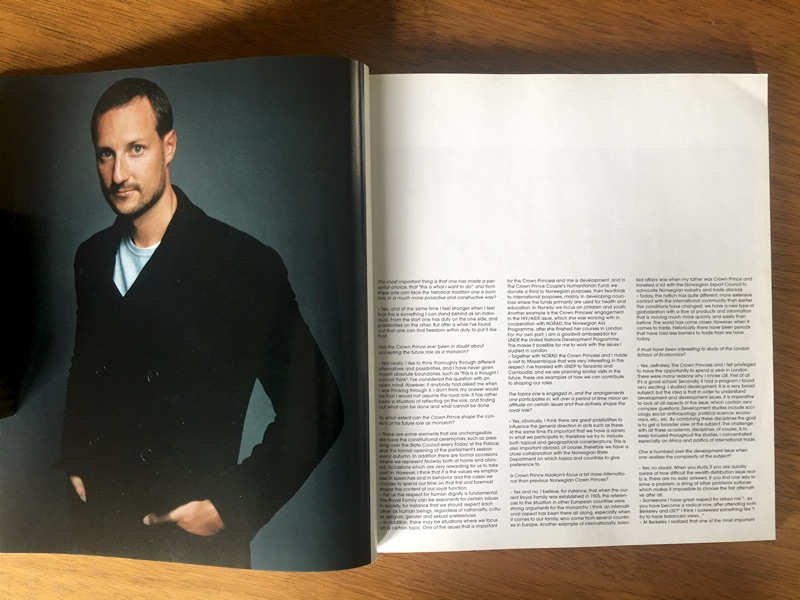
The Crown Prince belongs to the new generation of royals in Europe. Is there reason to believe that this young generation will change the way the citizens of Europe look upon the monarchy?
– Of course, it is important how the royals themselves manage their duties and responsibilities. Their conduct will have a direct influence on how the monarchies are generally regarded. For our part, it’s important to be a monarchy for the times we actually are living in.
– It can be a nice experience to travel in countries where you are not recognized.
It was once said that “the poor man wants to be rich; the rich man wants to be king.” Is it sometimes the royals’ dream to be absolutely anonymous?
– Once in a while I guess it can be. Sometimes it can be stressful to be tailed by photographers and others. In that sense it can be a nice experience to travel in countries where you are not recognized.
Is it a great loss not to have the opportunity to mingle freely in society?
– Well, I think we have more freedom than people tend to believe. We can walk around freely. And that is significant for us; we can walk in the woods, go skiing, go boating, visit cafés and restaurants, shop, go to the movies – these ordinary things that people do – that’s important to us. First of all not to isolate ourselves, because we would like to be a part of the society we are living in – and because I think it is good for one’s mental health to do such things.
– There are some strings attached to our freedom that many think of as obstacles for the right to make a free choice. However, after all, the freedom we do have is something we truly value highly.
But there are some limitations?
– Certainly, there are several things that limit our personal freedom. That is obvious. For example, ceremonies that usually are private are more public for us: Baptisms, confirmations, marriages, and so on. Our opportunities in the choice of future professions are also relatively limited… There are some strings attached to our freedom that many think of as obstacles for the right to make a free choice. However, after all, the freedom we do have is something we truly value highly.
How is it to deal with photographers with long lenses taking pictures from boats outside a coastal resort in the summer?
– That can be a bit annoying.
Over the years the press and the media have been an important channel for the monarchy’s communication with the citizens. In recent years, however, the media has shown much more aggressiveness and boundaries have repeatedly been crossed. How does the Crown Prince relate to this development, and how does he want to handle it?
– All children have a special right to protection.
– We have to relate to the situation as it is. However, generally we greatly appreciate our relation to the media. We have a good relationship, I think. Moreover, it is important for us to get some of our messages across through the media. Visits to places and regions in Norway which lead to coverage where the media mentions the things that were on our mind, I think are examples of meaningful collaboration with the press. Both parties benefit from this.
But the press and media are becoming more and more ruthless?
– However, what we really are concerned with in today’s media age is the children’s particular right to protection. This concerns both taking pictures and gathering information. When photographers are out taking pictures, they should ask the guardians for permission to take pictures of the children. Secondly, they should show consideration in the way they behave. That is most important. Furthermore, there is the gathering of information, and this reaches much wider than just being on location. It’s about talking to friends of the children, asking friends’ parents, talking to other people who have become acquainted with the children, and so on. These are situations where one should take utmost care and consideration. Also, of course, in situations where the media pays money in exchange for information. These are aspects we think are important, and we wish to focus somewhat on that.
To protect those who are susceptible to pressure?
– It’s especially crucial to show these considerations when it comes to children, who are in a much more vulnerable position than adults. I don’t think the media is legally entitled to write stories about children without having permission from their guardians. All children have a special right to protection. It’s important that the press acts accordingly.
Is the current media situation discussed when the Crown Prince meets other members of the European royal families?
– Yes, absolutely, it happens. It can be one of several topics we discuss. It’s interesting to meet people who are in the same position as we are; it can be nice to discuss which cases one is involved in, what’s important to signal in our role and the media situation generally. I find this very rewarding. I am heartened by talking to others in a similar position.
It must be interesting to exchange experiences, even though the situation varies from country to country?
– Yes, and I think that it’s important for commentators to remember that the royal families are each and one unique. We have different historical roots, and we all have to relate to the current situation in our own countries. A move that is right in one country may not work quite as well in other countries. There are differences even though there are clear similarities.
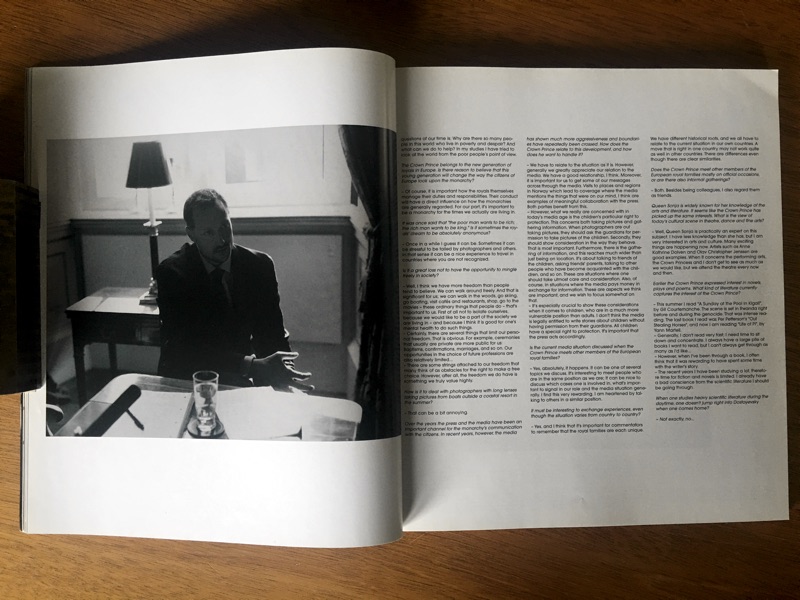
Does the Crown Prince meet other members of the European royal families mostly on official occasions, or are there also informal gatherings?
– Both. Besides being colleagues, I also regard them as friends.
Queen Sonja is widely known for her knowledge of the arts and literature. It seems like the Crown Prince has picked up the same interests. What is the view of today’s cultural scene in theatre, dance and fine arts?
– Well, Queen Sonja is practically an expert on this subject. I have less knowledge than she has, but I am very interested in arts and culture. Many exciting things are happening now. Artists such as Anne Kathrine Dolven and Olav Christopher Jenssen are good examples. When it concerns the performing arts, the Crown Princess and I don’t get to see as much as we would like, but we attend the theatre every now and then.
Earlier the Crown Prince expressed interest in novels, plays and poems. What kind of literature currently captures the interest of the Crown Prince?
– This summer I read “A Sunday at the Pool in Kigali”, by Gil Courtemanche. The scene is set in Rwanda right before and during the genocide. That was intense reading. The last book I read was Per Petterson’s “Out Stealing Horses”, and now I am reading “Life of Pi”, by Yann Martell. Generally, I don’t read very fast; I need time to sit down and concentrate. I always have a large pile of books I want to read, but I can’t always get through as many as I’d like… However, when I’ve been through a book, I often think that it was rewarding to have spent some time with the writer’s story. The recent years I have been studying a lot, therefore time for fiction and novels is limited. I already have a bad conscience from the scientific literature I should be going through.
When one studies heavy scientific literature during the daytime, one doesn’t jump right into Dostoyevsky when one comes home?
– Not exactly, no…
What kind of music is the Crown Prince listening to these days?
– Many different kinds. I guess my taste has changed over the years. I listen to much quieter music than before. However, for those of us who defined our youth in the beginning of the nineties, it’s nice to have bands like Audioslave – a combination of the vocalist in Soundgarden and Rage Against the Machine – or Queens of the Stone Age, which have elements from Kyuss, Foo Fighters and Screaming Trees. I listen a bit to that sort of music still, I think it’s fun. But in addition I listen to jazz, and mostly electronically based music. But I also listen to hip-hop, pop, classical. There’s a wide spectrum of styles. But I’m unable to listen to music as much as I want. The social setting has changed. It’s different when you are twenty years old and single… I guess it’s a natural development. I really enjoy music, but I’m not as updated as I used to be. However, one thing that is really exciting is the way Norwegian music has progressed in recent years. We now have a large number of writers, composers and artists within several genres – some have even been successful internationally. That is truly impressive. I also find it pleasant that the different genres aren’t as separated as before. Now there is a creative mixture of styles that adds up to very interesting music.
Does the Crown Prince still have the five-foot-tall speakers at the Skaugum residence that Princess Märtha mentioned some years ago?
– Yes, I do in fact. But now they are integrated into a large surround system. The Crown Princess and I are very interested in film, so now we can invite friends for home movie shows.
Norwegian creative clusters in fashion, design, music and film are experiencing a growing interest from markets both in Norway and abroad. Are we building a self-confidence level from where a creative industry can become an important trade business in the future?
– Yes, it seems to me that we are. I am very happy that we have managed to send out so many talented people within the artistic and creative disciplines: music, film, design, architecture, and so on. I believe there is a large economical potential here, a knowledge-based, creative business that can result in more business sectors in the future. Regardless of type of business or trade we must develop Norwegian products that carry a design and a quality that separates them from other products in a tough, competitive, global market.
– It’s imperative that we let the future generations take part in the income and expertise we are generating now.
Norway should not only be known internationally for oil and gas?
– Oil and gas represent approximately twenty per cent of the Norwegian gross national product, so there are several revenue-generating industries other than those. As a whole there is a great amount of specialized knowledge and expertise in Norway, and we must make efforts to keep and nurture this advantage. It’s imperative that we let the future generations take part in the income and expertise we are generating now.
Is the Crown Prince an environmentalist?
– Care for the environment is one of the most important questions of our time.
– Unquestionably. Care for the environment is one of the most important questions of our time. This is something we all must keep in mind. The environmental issues must always be a central component in all development projects, and we must not forget that the protection of the environment is a constant challenge that demands focus and dedication. We must always strive for new and better solutions. The ways in which wealthier countries behave in the environmental issues give very important signals to the other countries. Every now and then there is a drop in the public interest for environmental issues, and that is when it is most important that we remind ourselves of how fundamental it is to have a conscious, day-by-day relationship to this issue.
During the last decades Norway has been changing to a country with people from many nations and cultures. How does the Crown Prince view this development in relation to the original Norwegian culture?
– We are in an era where the multicultural element is growing stronger, and I believe that is a natural process. I value the principle of respect for human dignity, no matter where you come from or which culture or religion you belong to. I support the idea of cultural freedom. I believe people can have more than one cultural identity, without turning this into a problem. It can in fact be an advantage. You can, in my opinion, be a cook, a football fanatic, a stamp collector, an opera lover and wife at the same time. You can also feel a natural attachment to more than one country. It is possible to be both Ethiopian and Norwegian, Pakistani and Norwegian, or Chinese and Norwegian – and at the same time be as good a citizen as anybody else. Cultural diversity actually can be turned into a resource.
The new digital age has lead to the creation of new arenas for music, literature, culture, design and fashion. How does the Crown Prince view this digitalized, globalized culture?
– I believe people can have more than one cultural identity, without turning this into a problem.
– First and foremost, the digital age is about being able to reach out to a large audience without having to rely on access to a large and complicated distribution network – that is the main difference. Through the global digital network one can distribute words, pictures and sound in a very fast and effective manner. This situation has created a whole new set of opportunities. For example, it’s easy to exchange music files with persons on the other side of the world, to collaborate online. From this new technological reality, new, exciting environments arise. That is a fascinating aspect of the globalization.
This media development is fundamentally democratic, isn’t it; one is no longer dependent on the large national broadcast networks in order to reach out to people?
– Yes, that’s right. But still, globally there are different levels of access to this technology. There are still limitations in the Internet infrastructure.
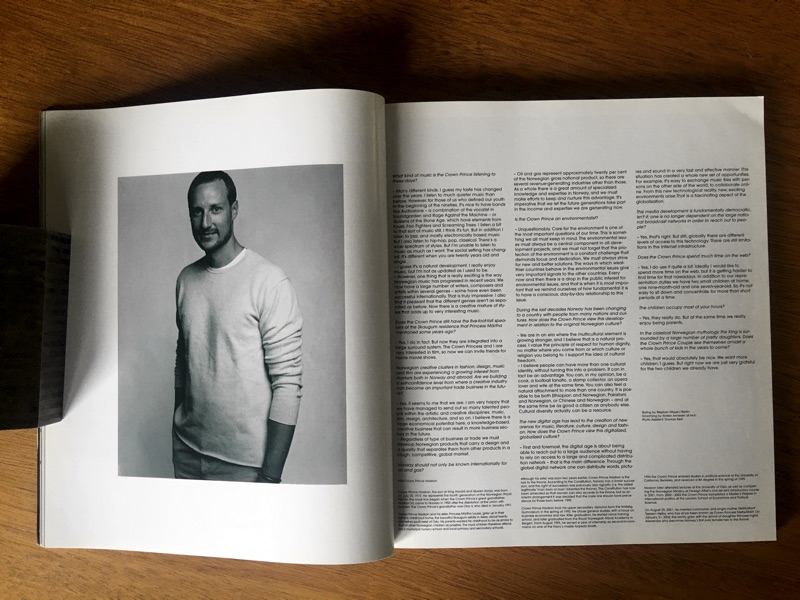
Does the Crown Prince spend much time on the web?
– Yes, I do use it quite a bit. Ideally I would like to spend more time on the web, but it is getting harder to find time for that nowadays. In addition to our representation duties we have two small kids at home, one nine-month-old and one seven-year-old. So it’s not easy to sit down and concentrate for more than short periods at a time.
The children occupy most of your hours?
– Yes, they really do. But at the same time we really enjoy being parents.
In the classical Norwegian mythology the King is surrounded by a large number of pretty daughters. Does the Crown Prince Couple see themselves amidst a whole bunch of kids in the years to come?
– Yes, that would absolutely be nice. We want more children, I guess. But right now we are just very grateful for the two children we already have at home…
HRH Crown Prince Haakon
Crown Prince Haakon, the son of King Harald and Queen Sonja, was born on July 20, 1973. He represents the fourth generation of the Norwegian Royal Family. The royal line began when the Crown Prince’s great grandfather, Haakon VII, came to Norway in 1905 after the dissolution of the union with Sweden. The Crown Prince’s grandfather was Olav V, who died in January 1991.
Crown Prince Haakon and his sister, Princess Märtha Louise, grew up in their father’s childhood home, the beautiful Skaugum estate in Asker, about twenty kilometres southwest of Oslo. His parents wanted his childhood to be as similar to that of other Norwegian children as possible. The royal children therefore attended a municipal nursery school and local primary and secondary schools.
Although his sister was born two years earlier, Crown Prince Haakon is the heir to the throne. According to the Constitution, Norway has a linear succession, and the right of succession was previously also agnatic (i.e. the oldest legitimate “man born of man” inherited the throne). The Constitution has now been amended so that women can also accede to the throne, but as an interim arrangement it was decided that the male line should have precedence for those born before 1990.
Crown Prince Haakon took his upper secondary diploma from the Kristelig Gymnasium in the spring of 1992. He chose general studies, with a focus on business economics and law. After graduation, he started naval training school, and later graduated from the Royal Norwegian Naval Academy in Bergen. From August 1995, he served a year of internship as second-in-command on one of the Navy’s missile torpedo boats.
1996 the Crown Prince entered studies in political science at the University of California, Berkeley, and received a BA degree in the spring of 1999.
Haakon later attended lectures at the University of Oslo, as well as completing the Norwegian Ministry of Foreign Affair’s civil servant introductory course in 2001. From 2002 – 2003 the Crown Prince completed a Master’s Degree in international politics at the London School of Economics and Political Science.
On August 25, 2001, he married commoner and single mother Mette-Marit Tjessem Høiby, who has since been known as Crown Princess Mette-Marit. On January 21, 2004, the family grew with the arrival of daughter Princess Ingrid Alexandra who becomes Norway’s first ever female heir to the throne.
